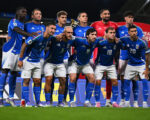The power went out, but the audience remained in place. When the lights returned, strong winds drove rain sideways. Even by Concacaf’s high benchmarks, conditions in Managua for Nicaragua’s World Cup qualifier against Haiti last month were extreme.
«It was pouring rain. The supporters went wild with every lightning strike. At one point the downpour was so intense, I couldn’t see where the goalie kicked from on goal kicks,» Haiti defender Duke Lacroix recounted.
However, Nicaragua’s fans were undeterred.
«When the lights flickered, the crowd became even more excited,» Lacroix stated. «We emerged again, and no one flinched. Everyone stayed put.»
Nevertheless, despite the adverse conditions, Lacroix and Haiti left the crowd soaked and disheartened. Lacroix contributed to the last goal in a 3-0 triumph for Haiti.
«To compete on foreign turf, you must take pride in quelling those environments,» he remarked.
When Haiti plays its concluding match of the FIFA World Cup qualifying series on Tuesday, the atmosphere will be significantly quieter than what it faced during three excursions to Central America.
In March 2024, Haiti’s long-standing national venue, Stade Sylvio Cator, fell under gang control, prompting the Haitian federation to release a statement acknowledging it had lost control of the arena and confirming instances of vandalism. It has since hosted no events, and its capability to hold significant matches remains uncertain. This leaves Haiti without an authorized venue, even if stability were restored.
The nation has been engulfed by violence as gangs exploit the power void following the 2021 assassination of president Jovenel Moïse. The United Nations’ High Commissioner for Human Rights referred to the situation as an «endless nightmare,» and that organization’s July 2025 report noted over 1.3 million Haitians have been displaced, with 85% of Port-au-Prince under gang dominance.
«People are fleeing their residences,» stated Don Deedson Louicius, an FC Dallas and national team forward who grew up near Toussaint Louverture Airport in Haiti’s capital. Planes arriving there in November 2024 came under gunfire, leading to a FAA prohibition on U.S. flights. He still has relatives in that region.
«They can’t live properly, and all places are shut down due to gangs, and the violence is extreme,» Louicius explained.
Curaçao, a Dutch Caribbean isle, has become Haiti’s temporary base this autumn, with Thursday’s clash against Costa Rica and Tuesday’s match with Nicaragua scheduled at Ergilio Hato Stadium in Willemstad, over 500 miles away from Haiti.
This positions Les Grenadiers alongside teams like Ukraine, Palestine, Belarus, and Israel as a nation striving to qualify for the 2026 World Cup in North America without the ability to play at home and enjoy the associated advantages. To qualify, Haiti needs to secure second place in its group and earn more points than at least one of the other second-place teams; currently on five points, two wins may be needed to reach 11 points for a shot at Canada-Mexico-U.S. 2026.
Yet, Haiti’s players are resolved to achieve a World Cup return that they believe could transform not just Haitian soccer but the country itself.
In World Cup qualification, atmosphere acts as the great equalizer.
Bolivia is in the intercontinental playoffs for the World Cup partly because it brings teams to the highest elevation possible, playing at the Estadio de Villa Ingenio in El Alto, 13,615 feet above sea level, to exploit the altitude. Even regular qualifiers are not exempt from the temptation to make things uncomfortable for visiting teams. The U.S. men’s national team scheduled its February 2022 match against Honduras in St. Paul, Minnesota, winning 3-0 in conditions where the temperature at kickoff was -16 degrees Celsius. Yes, that’s Fahrenheit.
The last opportunity Haiti had to compete in a senior national team match on its soil was in July 2021, when it hosted Canada for a World Cup qualifying match leading up to the 2022 tournament.
Even that was mired in controversy, considering Belize had come in March for a World Cup qualification match and felt unsettled when its bus from the airport to the team lodging was intercepted by armed men on motorcycles. They were ultimately granted safe passage to their accommodation, but departed just for the match, practicing by the hotel pool after the incident.
«No one wants to experience a situation like that with guns aimed at you,» Belize captain Deon McCauley remarked post-incident. «You only have one life, and to be uncertain after a terrifying event like that? It’s shocking.»
The team’s four-year hiatus means that as players who are eligible for Haiti but born abroad have been brought in, several members of this month’s roster are representing the nation without ever having the chance to play in front of a crowd of Haitians.
«I’ve never played in Haiti, but everyone I speak to who has played there says it makes such a big difference to have your supporters, your country behind you, and you truly feel it,» remarked Garven Metusala, a defender born in Quebec who debuted for Haiti in 2022. «It seems like we all are accustomed to not playing in front of our supporters now. I don’t believe we can use it as an excuse anymore.»
While the crisis in Haiti continues to worsen, some leaders believe soccer must return. The sport provides society with an emotional lift, says Marie Elise Obas, the general secretary of the Ligue Haïtienne de Football, the nation’s primary league, and offers young men opportunities that enable them to support their families—just one more avenue to avoid gang involvement. Haiti’s first division resumed last weekend, with teams from the capital participating after several special tournaments only included clubs from regions where gang violence has not been as rampant.
«Things are not improving significantly, but we are making efforts,» Obas stated. «In Haiti, we face extensive insecurity, yet we must continue living.»
Before the final segment of World Cup qualification, which commenced in September and concludes next week, Haiti’s coaching staff and players had aspired to return home for games in front of their supporters. As the nation’s situation intensifies, however, it became unrealistic.
In addition to Haiti missing local support and the competitive advantage, it also diminishes the revenues of a team that is already financially challenged compared to its competitors.
«The national team is compelled to play its matches away from home, leading to considerable revenue shortfalls,» Obas emphasized.
The longer the team is unable to play securely at home, the greater the loss of income accumulates. Additionally, as multiple sectors struggle during the ongoing crisis, Obas noted that the list of potential sponsors for local teams and the national squad diminishes continually.
Nonetheless, the strong bond between the national team and its supporters persists.
«Clearly, for the fans and for me as the coach, I would love for us to play in Haiti. Unfortunately, that decision is beyond my control right now,» said manager Sébastien Migné, who also encouraged the federation to choose an alternative location with a significant Haitian diaspora. Canada (especially Montreal), the U.S. (notably Miami), and the neighboring Dominican Republic meet that criterion.
However, even those potential locations have become precarious for Haiti. At times, soccer has transcended political divisions, with Dominican Republic clubs hosting Haitian teams in international matches for extended durations. Jamaica recently provided support as the training ground for Haiti’s U17 men’s team prior to their World Cup trip to Qatar.
Yet political tensions have complicated Haiti’s search for alternative host sites. Earlier this year, U.S. president Donald Trump signed a proclamation that halted visa issuance to Haitians. Exemptions for sports teams for sanctioned events enabled Haiti to participate in the Gold Cup without complications. The Dominican Republic prohibited entry with a Haitian passport in 2024, with its president Luis Abinader declaring a crackdown on migrants who have entered the DR without proper documents.
«It feels like closed doors for Haiti everywhere,» Louicius stated. «Thus, it becomes exceedingly challenging for those who remain in Haiti right now. It’s incredibly hard.»
A significant portion of the support Haiti’s players receive from fans is conveyed through digital channels. Instead of the roars of fans facing a downpour, they get notifications, voice messages, and commendations in videos.
«All those (fan) pages, all those supporters were sending positive words» following the Nicaragua victory, Metusala remarked.
With most supporters only able to observe their team through TV or online streams, the connection with their players is fostered through social media.
«Even while we’re not physically present for them to cheer us on, we feel at home due to the encouragement we receive via phone, messages on Instagram, Facebook is significant,» Louicius expressed. Following the Nicaragua win, «we received backing from everywhere, from Haitians across the globe.»
It is through these exchanges and discussions with loved ones in Haiti that the players sense they may achieve something extraordinary, the belief that if they qualify for the World Cup, it could ignite transformation in a nation long hoping for reasons to celebrate.
«In conversations regarding this with some fellow players on the team, we recognize this could bring substantial change in the country,» Metusala noted. «Even from a political standpoint, this could spread joy, alter the country’s atmosphere, and instill hope in the people. We’re aware of the strong passion Haitians have, and how closely they follow the team.
«We desire to qualify not just for ourselves, but to give back to the Haitian populace.»
Several players mention they have discussed the prospect of creating a moment akin to Didier Drogba’s peace speech after an October 8, 2005 World Cup qualifier that secured Ivory Coast‘s berth in the 2006 tournament.
«There will be a new Haiti. If we reach the pinnacle, I believe the current troubling issues in the country will cease,» Louicius stated. «That’s our belief. We think we can drive change for Haiti.»
Drogba’s remarks from Sudan, lasting less than a minute, did not immediately resolve the enduring Civil War. Other elements contributed to an eventual shift toward peace. Yet, it acted as an ignition, one of numerous catalysts aligning perfectly.
Haiti has a deep affinity for soccer, with large groups assembling to witness beloved matches of the Brazil and Argentina teams alongside their own national squad, yet it lacks a player with Drogba’s stature. Before contemplating such a moment, however, the focus is on executing well on the field absent the tangible support of their country.
«We lack a magical solution that will transform everything in two days,» chairwoman Obas articulated. «This will require time.»

















